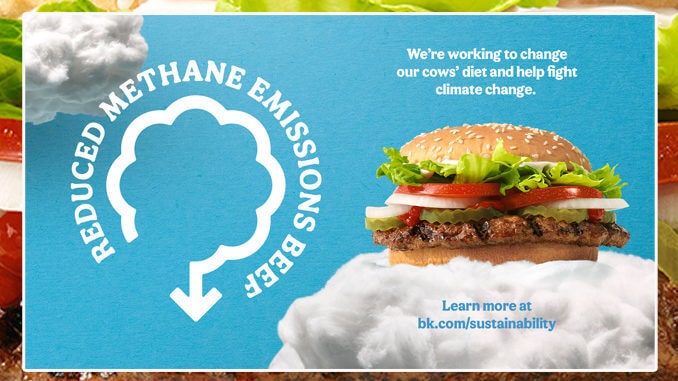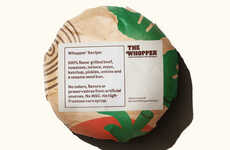
The Burger King Reduced Methane Emissions Beef Whopper is Available Now
Michael Hemsworth — July 16, 2020 — Eco
The Burger King Reduced Methane Emissions Beef Whopper is a new offering from the QSR brand that aims to help reduce the amount of methane that goes into the atmosphere due to the farming of its cattle. The burger is made with meat sourced from cows that have been fed a diet that helps to reduce its methane production by as much as 33% per day. This will come as welcome news to consumers who are weary about the implications related to their diet choices.
The Burger King Reduced Methane Emissions Beef Whopper is available exclusively at five locations across the United States in Miami, New York, Austin, Los Angeles and Portland, but only while supplies last.
Image Credit: Burger King
The Burger King Reduced Methane Emissions Beef Whopper is available exclusively at five locations across the United States in Miami, New York, Austin, Los Angeles and Portland, but only while supplies last.
Image Credit: Burger King
Trend Themes
1. Eco-friendly QSR Burgers - Offering eco-friendly burgers has the potential to attract mindful consumers who prioritize sustainability and environmental responsibility in their diet choices.
2. Sustainability in Agriculture - Reducing methane emissions from cattle could lead to innovations in sustainable farming practices for the fast food industry.
3. Consumer Education on Sustainable Food Practices - Promoting the Reduced Methane Emissions Beef Whopper could raise awareness on the impact of cattle farming and the role of sustainable agriculture in reducing environmental damage.
Industry Implications
1. Fast Food - Incorporating sustainable and eco-friendly practices in fast food can foster brand loyalty and attract customers who prioritize sustainability in their dining choices.
2. Agriculture - Adopting sustainable farming practices that reduce methane emissions could grow to become a disrupting innovation in the agriculture industry.
3. Environmentalism - Reducing carbon emissions and promoting sustainable food practices can become new standards for companies that prioritizes environmental concerns in their businesses.
2.6
Score
Popularity
Activity
Freshness























